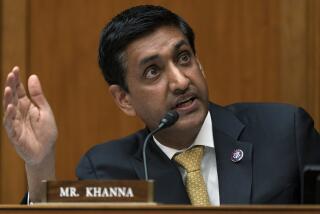McDonnell Deal Faces New Doubt : Aerospace: Delays in Taiwan’s purchase of a stake in the firm raise questions about the enthusiasm of private investors in that country.
- Share via
TAIPEI, Taiwan — A succession of delays in Taiwan Aerospace Corp.’s proposed investment in McDonnell Douglas is prompting new questions about the enthusiasm of private investors in Taiwan.
The government owns 29% of Taiwan Aerospace but wants the private sector to finance most of Taiwan’s investment in McDonnell’s commercial aircraft business. And industry has begun expressing doubts about a deal that could amount to a $2-billion purchase of a 40% stake in the Long Beach-based operation.
“It’s already quite clear that the government won’t be doing the (main share of the) investing,” Ting Shou-chung, a Nationalist Party legislator involved in parliamentary consideration of the project, said in an interview last week. “The private companies will be doing the investing.”
But whether private firms are willing to invest heavily, Ting said, “all depends on how the government guides things.”
Meanwhile, McDonnell’s continuing failure to win orders for its new MD-12 jetliner program, a centerpiece of the Taiwan deal, seems to be at the heart of the reluctance of Taiwan investors, U.S. analysts say. Taiwan would build the MD-12’s fuselage and wings.
“I don’t believe, regardless of what McDonnell says, that Taiwan is going to buy into the company without an assured MD-12 program,” Prudential Securities analyst Paul Nisbet said.
Indeed, a briefing that Taiwan’s parliament will receive Wednesday on the McDonnell deal--a presentation that was unexpectedly delayed last week--appears pegged to a major sales meeting McDonnell has scheduled with key airlines considering purchases of MD-12s, Nisbet said.
Swiss Air, Federal Express and Delta Air Lines are reportedly interested in the jumbo jet designed to compete with the Boeing 747, he said.
But the task of coordinating several major launch orders and building a political consensus in Taiwan is a tall order for McDonnell. From Taiwan’s perspective, the McDonnell commercial aircraft business could not be worth $2 billion without an MD-12 program, analysts said.
Tang Feng, project manager for Taiwan’s Aviation and Space Industrial Development Committee, said last week that the deal probably will go forward but that the percentage of the McDonnell operation purchased by Taiwan Aerospace may be less than 40%.
The one-week delay in Economics Minister Vincent Siew’s report to the legislature on McDonnell was officially attributed to the need to complete legislative review of the government’s budget. But that explanation met with skepticism among observers in Taipei.
“They’re not ready,” one Chinese analyst said last week. Siew “needs more time to prepare for the presentation.”
The delay has left corporate investors uncertain about how a deal would be structured.
“We don’t know how Taiwan Aerospace will invest in McDonnell,” Formosa Plastics spokesman Jen Chao-chuan said. “So there’s no way for us to make any decisions now. Taiwan Aerospace itself doesn’t understand what the government has in mind for Taiwan Aerospace and what role it (Taiwan Aerospace) will play.”
Huang Min-hsun, deputy manager of Yue Loong Motor Group, said his firm will continue to support aviation efforts by Taiwan Aerospace “no matter what happens with the McDonnell deal. . . . (But) we don’t know what the results of the (government) report are. So we don’t know what sort of attitude to take.”
Concern that some private firms have expressed about Taiwan Aerospace may be “a way to get the government to give them a better package, such as tax-free or low-interest bank loans, to encourage them to invest,” said the Chinese analyst.
Siew has said that the government’s report on McDonnell is basically favorable.
“According to the evaluation report, McDonnell, in its technological development ability, is better than other aerospace companies,” he said. “But there is room for improvement in its marketing, finances and management.”
Siew said a link between Taiwan Aerospace and McDonnell “could pull forward the development of related industries in our country, nurture high-tech talent and help us get into the international aerospace industry. While this investment deal has some risks, it is a rare opportunity that should not be missed.”
The McDonnell deal could increase Taiwan’s gross domestic product 1% to 1.8% by 2005 and create 40,000 to 50,000 jobs, according to an unnamed Economics Ministry official quoted in the United Daily News.
But without government subsidies or guarantees, it is unclear whether the proposal is financially attractive to corporate participants.
Earlier this month, Taiwan Aerospace picked Earle Ho, chairman of one of its backers, Tung Ho Steel, to serve as its chairman after the abrupt resignation of David Huang. But even Tung Ho Steel has expressed reservations about the deal.
“Tung Ho Steel pointed out that the selection of its chairman by the Taiwan Aerospace board to serve as their chairman certainly should not be seen as the equivalent of Tung Ho Steel putting capital into Taiwan Aerospace,” the China Times reported. “This certainly doesn’t mean that Tung Ho Steel will necessarily invest in the McDonnell deal.”
A spokesman for Tung Ho declined comment on the report.
The China Times reported that “as for the Tatung Group, another large investor in Taiwan Aerospace, it has expressed concern about the rate of return on investment in the McDonnell deal.”
Holley reported from Taipei and Vartabedian from Los Angeles. Times special correspondent Bruce Einhorn in Taipei also contributed to this report.
More to Read
Inside the business of entertainment
The Wide Shot brings you news, analysis and insights on everything from streaming wars to production — and what it all means for the future.
You may occasionally receive promotional content from the Los Angeles Times.









